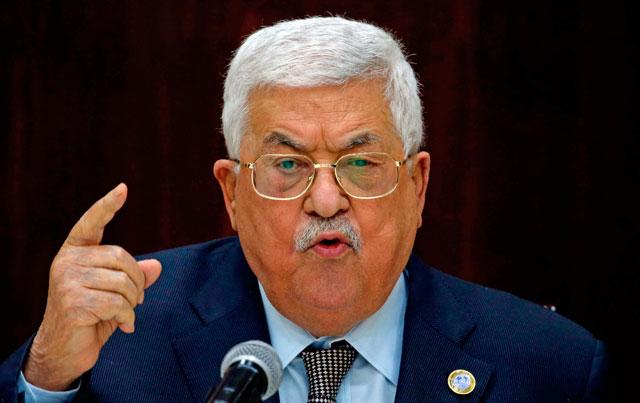You are here
Palestinians keep up refusal of tax revenues after Israel cuts
By AFP - Apr 29,2019 - Last updated at Apr 29,2019
RAMALLAH, Palestinian Territories — The Palestinians on Monday restated their refusal to accept tax revenues collected on their behalf by Israel so long as Israel deducts millions of dollars over a dispute about prisoners.
"Our position is as it was: We will not receive any money from Israel if it is incomplete," Palestinian Authority (PA) President Mahmoud Abbas told the weekly Cabinet meeting in the West Bank city of Ramallah.
"This is something we will not accept at any cost."
Israel collects around $190 million a month in customs duties levied on goods destined for Palestinian markets that transit through Israeli ports, and then it transfers the money to the PA.
In February, Israel decided to deduct around $10 million a month from those revenues, corresponding to the amount it said the PA paid families of prisoners or directly to inmates serving time in Israeli jails.
The Palestinians responded by saying they would refuse any funds where unilateral deductions had been made.
Israeli public radio reported Monday that a month’s payment — minus the $10 million deduction — had recently been transferred to PA bank accounts, in the hope the authority would quietly accept payment.
But after two weeks, the radio said, the money was returned to the Israeli finance ministry.
Israel sees the payments to those who have allegedly carried out attacks against Israelis as encouraging further violence.
The PA says the payments are a form of welfare.
The Arab League pledged last week to provide the PA with $100 million monthly, potentially averting a financial crisis caused by the row.
Abbas on Monday called on the body to honour that pledge.
“We do not have high hopes, but perhaps the amount could be considered a debt that we return as soon as Israel returns” the money, he said.
Abbas also renewed his opposition to a proposed US peace plan expected to be unveiled this summer.
He has refused to negotiate with Donald Trump’s administration since December 2017, when the US president controversially recognised Jerusalem as Israel’s capital.
Abbas praised Europe’s continued support for a two-state solution and opposition to the US embassy move, and said the continent had a responsibility to solve the conflict.
“The European position — I don’t want to say it is 100-per cent fair, but it has started to [show] understanding,” he said.
Related Articles
RAMALLAH, Palestine — The Palestinian Authority (PA), in deep financial crisis since Israel froze tax transfers in February, said Thursday i
The Palestinian Authority said on Wednesday it had received a $100 million loan from Qatar to help pay civil servants salaries and alleviate an economic crisis triggered by a row with Israel over taxes.
RAMALLAH, West Bank — The Palestinian Authority (PA) will no longer accept tax revenues collected on its behalf by Israel following its deci


















